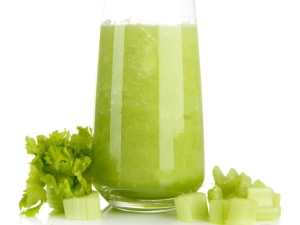The benefits and harm of celery during pregnancy and breastfeeding

When a woman bears a baby, and later breastfeeds him, her body should receive all the necessary vitamins and minerals. Mom's balanced diet will help your baby grow healthy and develop properly.
Many women are interested in whether celery can be eaten in such a delicate position, because those who adhere to the principles of healthy eating know about its benefits not by hearsay.
Special features
Celery is a versatile plant, because all its parts are edible. The root is cleaned and used to make salads, vegetable dishes, sometimes as a side dish. Some prefer to eat it raw.
The stem has a very delicate texture, lends itself well to heat treatment. It can be eaten raw, boiled, stewed. Dieters often make celery cocktails. It is low-calorie, provides the body with fiber and vitamins. Foliage is also eaten raw or dried to have original spice for meat and fish dishes in winter. The leaves taste a bit like parsley, but have a milder flavor.
As part of celery you can find vitamins A, C, E, PP, the entire group B. Also, it contains elements such as calcium, phosphorus, potassium and magnesium. A lot of vegetable iron, sodium. In addition, it contains beneficial pectins, flavonoids, amino acids, a large amount of essential oils. Celery has a minimum calorie content - only 12 kcal per hundred grams of product. Proteins in it - 0.9 g, fat - 0.1 g, and carbohydrates - 2.1 g.
It would seem that such an impressive composition of useful elements simply obliges pregnant and lactating women to include the product in their diet. However, with this vegetable is not so simple. Let's try to figure it out.
Is it possible to eat during pregnancy?
Celery has a lot of useful qualities, it is recommended by nutritionists and doctors all over the world. Consider the main positive characteristics of the plant that can help a pregnant woman.
- Improved vision. During pregnancy, many women complain that their eyesight falls. Vitamins A and C, which are in a vegetable, will help to cope with such a nuisance.
- Strengthening immunity. In the period of gestation, women are not recommended to get sick, since they should not take most of the medicinal preparations. Celery will improve immunity and support the body during epidemics.
- Normalization of metabolism. Due to this property, the vegetable will not only help food to digest faster, but will also speed up the metabolism, not allowing a woman to gain many kilograms for the entire period of gestation.
- Fighting stress. Pregnancy does not always proceed as desired. Frequent nervous tension, abandonment of favorite foods can provoke prolonged stress, which cannot be treated with medications. The use of celery will reduce the level of anxiety, give a good sleep.
- Pain relief. Sometimes the last months of pregnancy turn into a real hell, especially for skinny mothers. Back and head ache, swollen legs, aching bones. Celery can also deal with these symptoms.
- Strengthening the heart muscle. Correct and smooth functioning of the heart is a guarantee of mother's well-being, therefore, this vegetable is recommended as a support. In addition, it will help to establish the work of the vessels.
However, there are several serious contraindications to eating celery, which can greatly complicate the pregnancy if you do not pay attention to them. Therefore, the use of the product is not always advisable.
- The plant contains essential oils that can provoke allergic reactions. Moreover, these oils will accumulate in the mother's body, which can adversely affect the future baby. After birth, he may develop an allergy to these oils, which will entail additional problems.
- Celery stimulates flatulence, frequent urging to the toilet.Perhaps some women will even be pleased with this fact, believing that this will help to partially get rid of the inevitably arriving kilograms. However, it is worth noting that it really doesn’t hurt much for the mother, but for the little one - it can.
- The plant contains certain substances that make blood flow well to the uterus. In the early stages of pregnancy, this can lead to dire consequences - an involuntary miscarriage and premature birth.
As you can see, the contraindications to eating a vegetable make you wonder. Despite all the properties useful for the future mother's body, doctors still do not recommend eating celery to women who are in the position. If you have always loved this vegetable, you miss its taste, limit it to a very small amount a couple of times a month.
Cooking celery is an important step, because it can be eaten raw only six months after birth. There are several options for how to cook a vegetable:
- add to soup;
- add them a salad;
- cook;
- put out
When cooking, be extremely careful, because not all the ingredients that you used before birth, you can eat after them. This applies primarily to nuts, honey, fatty sauces, sour cream and cream, citrus.
If you know for sure that your baby will not have allergies, you can try to make an interesting salad. To do this, cut two large green apples and a celery stalk. Ingredients are mixed, steamed raisins are added. The salad is filled with two tablespoons of light yogurt without additives. After 6-7 months of lactation, you can try to add walnuts (no more than 5 cloves).
HBV use
When the baby is already born, a contraindication for preterm birth can be safely removed from the accounts. Nevertheless, this does not mean that immediately you need to switch to eating a vegetable. In the first month, celery is strictly prohibited, since essential oils can cause severe allergies in both the mother and the baby. In addition, the plant can cause colic in a child, thereby ensuring you some sleepless and heavy nights.
For those moms who plan to breastfeed for up to a year or more, there is another bad news. If the baby feels stranger in the milk, which he does not like, the child may temporarily abandon the breast.
Experts recommend starting a gradual intake of the product no earlier than three to four months after the birth of the crumbs. Sometimes this period can last up to six months.
If you still want to enter celery in the menu when breastfeeding, this should be done correctly and gradually. First, eat a very small piece of the product, chewing it thoroughly. Then about two days you need to keep track of the crumbs. If there are signs of discontent, the child began to act up, cry, refuse breast, colic and flatulence torment him, then the use of the vegetable should be immediately stopped. The second time you can try celery after a month, when the baby is a little older, and his body is better adapted to the environment.
If the child has not responded to the new product, celery can be eaten, but in small quantities. The daily dose should be no more than five grams, and weekly - no more than fifteen. Most experts advise eating a vegetable once a week. So you can get vitamins and protect yourself from undesirable consequences.
There are several rules that will help the correct introduction of celery in the mom's menu.
- Trying to plant for the first time, give up the raw type of vegetable. It is better to eat a piece of boiled or stewed celery.
- During the first six months, you also cannot eat raw vegetables; you must cook them: boil, simmer, bake, add to soups, fry on a small amount of butter.
- During breastfeeding can not eat the roots and foliage of celery.Preference should be given exclusively to the stem, as it contains few aggressive components.
Ideally, if the vegetable does not cause negative reactions from the mother and child, because its use is not exaggerated.
During HB, the plant will saturate the milk with useful vitamins and microelements, will contribute to the improvement of the digestive tract, will quickly get rid of the weight gained during pregnancy.
In addition, celery will add variety to a limited menu of a nursing woman, allowing her to eat tasty and healthy.
How to choose and cook?
Buying celery in a store or on the market, you need to consider a few nuances.
- The stems and leaves of the vegetable should be bright green. Blotches, dots, dark spots are unacceptable. It is also not recommended to buy a plant on which signs of wilting clearly show through.
- A soft stem should be the reason for refusing to buy - such a vegetable will wither in a few hours.
- Buy the largest copies, not forgetting to inspect their upper part. Sometimes it happens that the plant radiates freshness and health, but the tip is covered with specks. Such a vegetable can not be taken. He has already begun to deteriorate.
In vegetable salads celery goes well with cabbage, carrots. If you like these vegetables, you can make a salad out of them. As a dressing, you can take a light mayonnaise or yogurt.
Preparation of juices that are of great benefit to the body will be a good idea. For example, to make an original drink, you will need a few celery stalks, a green apple and a carrot. All this is mixed in a blender and drunk immediately. In addition, celery can be extinguished as an independent dish, make cream soup on light chicken broth and cream, add to vegetable-rich stew with some vegetable oil in vitamins.
Whatever method of cooking you choose, you should always remember about the daily rate of celery and not exceed it. Only then the vegetable will benefit you and your baby.
How to grow celery yourself, you will learn from the following video.































